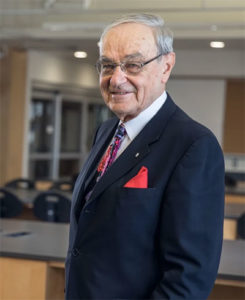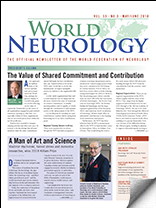Vladimir Hachinski, famed stroke and dementia researcher, wins 2018 Killam Prize
By Crystal Mackay
Dr. Vladimir Hachinski believes medicine and art are unequivocally linked.

Schulich School of Medicine & Dentistry professor Vladimir Hachinski, past president of the World Federation of Neurology and a world-renowned stroke expert, has been named a 2018 Killam Prize winner for Health Sciences. Hachinski is only the sixth Western University researcher to be given this honor. Photo credit Frank Neufeld // Western News
“The science of medicine lies in the technology, the knowledge, the algorithms. But the art of medicine begins where the technology ends – and that’s where good doctors excel,” said the world-renowned expert in the relationship between stroke and dementia, who also happens to be a composer and poet.
Today, the coalescence of his passion for art and health care have come together. Hachinski has been named a recipient of the Killam Prize, the highest honor for research from the Canada Council of the Arts. He is the sixth Western University researcher to be given this honor, which recognizes the career achievements of eminent Canadian scholars and scientists actively engaged in research, whether in industry, government agencies, or universities.
Five prizes of $100,000 are awarded each year, one prize in each of the fields of humanities, social sciences, natural sciences, health sciences, and engineering.
“I am delighted by the honor. But I realize this is not just about me; it is about all the work we have done,” said Hachinski, a Distinguished University Professor and Professor of Neurology at the Schulich School of Medicine & Dentistry, Western University, London, Ontario, Canada. “I am left with a tremendous feeling of gratitude – gratitude for the acknowledgement, but even more importantly, gratitude because it gives an opportunity to highlight what we are doing, and where we are trying to go, which is the most exciting thing.”
When he began his career, it was the commonly held belief in the medical profession that dementia was caused by hardening of the arteries which reduced blood flow to the brain. Early on, he discovered the majority of dementias were actually caused by multiple, small strokes. Hachinski coined the term “multiple-infarct dementia” in order to classify this condition.
“In that way, medicine is like poetry; I needed to boil it down to a simple term by using language to get to the essence of something.”
His love for both the arts and medicine began when he was a boy. His family fled the Soviet Union and emigrated to Venezuela when he was 7 years old. Hachinski would watch birds and animals out of his window. Inherently curious, he would sketch and draw them, wanting to understand how they moved and how their bodies worked.
In Venezuela, there was an expectation in high school that a student had to choose to study either arts and humanities or science – not both. Hachinski said it was a difficult and defining moment for him.
“I really was torn between medicine and history. How do you choose between two passions?”
The decision was a practical one.
“If I became a historian, I couldn’t really be an amateur doctor, whereas if I became a doctor, I could be an amateur historian,” said the man who even today often seeks guidance from poets.
Since earning his medical degree from the University of Toronto after his family emigrated to Canada, Hachinski has transformed the understanding, diagnosis, treatment, and prevention of the two greatest threats to the brain: stroke and dementia.
Early in his neurology residency, Hachinski became intrigued by the interaction of the brain, its blood supply, and the heart. He developed the Hachinski Ischaemic Scale, which is considered to be the most widely used clinical method to identify the difference between degenerative dementia (like Alzheimer’s disease) and multi-infarct dementia (cognitive impairment caused by multiple strokes).
Throughout his career, he has authored more than 800 well-cited research papers and has authored, coauthored, and edited 17 books. He founded, with John W. Norris, the world’s first successful acute stroke unit, and went on to establish the first stroke clinic in London, Ontario. That has led to stroke units being established around the world and has laid the groundwork for what is now considered the standard of care.
He received the Order of Ontario and Order of Canada. He was the president of the World Federation of Neurology from 2010 to 2013 and was inducted in the Canadian Medical Hall of Fame in 2018.
With all of those accomplishments, Hachinski said there have also been setbacks, and part of what has led to his successes has been the ability to persevere.
“If you are in research, you better be prepared for setbacks. I don’t think failing makes you a failure; failing to learn from them is a failure,” he said. “There is a continuous alternation between disappointment and triumph, and this is an important lesson.”
However, Hachinski believes his most important contribution to human health isn’t in what he has done in the past, it is in what’s coming next.
He and his team are keen on using experimental, clinical, and population health data together to implement strategies to prevent stoke and dementia together. In 2006, he and a group of colleagues helped establish World Stroke Day, which has contributed to increasing awareness of the prevention of risk factors for stroke.
They have already shown a new stroke initiative in the province of Ontario correlated with a 30 percent reduction in the incidence of stroke, and in turn, a 7 percent reduction in the incidence of dementia.
“This was the first time that we were able to show if you prevent one, you can prevent the other,” Hachinski said. “The end goal is to prevent, delay, or mitigate disease, and I think that we already have. Right now, we could prevent 90 percent of strokes if we did everything perfectly. And if we did everything perfectly for dementia, we could prevent 30 percent.”
He and his collaborators are working to persuade decision-makers to enact approaches that look for ways to prevent the two as part of the same strategy. He said it all comes back to looking at stroke and dementia, not in isolation but as part of the same.
“By doing this, we may able to change things for the better in a relatively short time,” he said.
With this announcement, Hachinski becomes Western’s sixth Killam Prize winner and the most recent winner since English professor David Bentley won in 2015. Other Western winners include Economics professor John Whalley (2012), Engineering professors Alan Davenport (1993) and Maurice Bergiougnou (1999) and Robarts Research Institute co-founder Henry Barnett (1988).
This story is reprinted with permission from Western News, a Western University publication.
